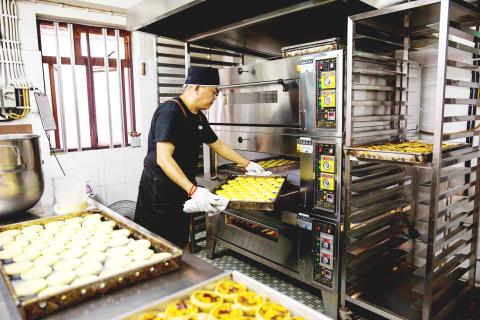With their flaky pastry casing, creamy custard filling and brulee topping, Macau’s Portuguese egg tarts are as much a part of the Chinese enclave’s fabric as its casinos — but their origin is surprisingly British.
Across the city it is not uncommon to see long lines of tourists patiently queuing for the sweet treats, a sight that might not seem all that surprising given the former Portuguese colony’s most famous dessert is based on Lisbon’s equally renowned pastel de nata.
But the current craze for Portuguese-style egg tarts — which has spread across China and parts of Asia in recent years — owes much of its success to a Briton who blundered into the business.

Photo: AFP
The tale began three decades ago when Essex-born industrial pharmacist Andrew Stow opened Lord Stow’s bakery at the southern harborside village of Coloane.
“In 1989, recognizing there were no Western street-side bakeries... he decided to do something for the local Portuguese community, which was to create a pastel de nata for them,” said Eileen Stow, Andrew’s sister, who now manages the business.
With no original recipe for pastel de nata to use, Andrew experimented with a heavier British custard filling, based on a family recipe, and Portuguese pastry techniques.
The creation initially raised a few eyebrows among Andrew’s Portuguese friends in Macau, but the local Chinese community became hooked.
Courtesy of the British, Cantonese cuisine already had a version of an egg tart, made with shortcrust pastry and a more jelly-like filling.
“To differentiate it from what they recognized in dim sum, a dan tat [egg tart in Cantonese,] they call it a po tat,” meaning Portuguese egg tart, Eileen said.
The creamier, flakier, richer versions were a roaring success.
“That’s how it grew before the days of ‘likes’ online. It’s just word of mouth,” added Eileen, who took over the business after her brother’s death in 2006.
The business now churns out 21,000 handmade egg tarts per day from three bakeries in Macau, and it also boasts two franchises in Japan and Manila.
A string of rivals have cropped up in the last three decades in Hong Kong, Taiwan and Singapore.
One of the best-regarded Macau competitors was set up by Andrew’s ex-wife Margaret Wong.
She sold her recipe to KFC, which now offers Portuguese egg tarts at outlets across China, a move that has introduced Macau’s Portuguese-British hybrid to hundreds of millions more hungry mouths.

The Democratic Progressive Party (DPP), Chinese Nationalist Party (KMT), and the country’s other political groups dare not offend religious groups, says Chen Lih-ming (陳立民), founder of the Taiwan Anti-Religion Alliance (台灣反宗教者聯盟). “It’s the same in other democracies, of course, but because political struggles in Taiwan are extraordinarily fierce, you’ll see candidates visiting several temples each day ahead of elections. That adds impetus to religion here,” says the retired college lecturer. In Japan’s most recent election, the Liberal Democratic Party lost many votes because of its ties to the Unification Church (“the Moonies”). Chen contrasts the progress made by anti-religion movements in

Taiwan doesn’t have a lot of railways, but its network has plenty of history. The government-owned entity that last year became the Taiwan Railway Corp (TRC) has been operating trains since 1891. During the 1895-1945 period of Japanese rule, the colonial government made huge investments in rail infrastructure. The northern port city of Keelung was connected to Kaohsiung in the south. New lines appeared in Pingtung, Yilan and the Hualien-Taitung region. Railway enthusiasts exploring Taiwan will find plenty to amuse themselves. Taipei will soon gain its second rail-themed museum. Elsewhere there’s a number of endearing branch lines and rolling-stock collections, some

Last week the State Department made several small changes to its Web information on Taiwan. First, it removed a statement saying that the US “does not support Taiwan independence.” The current statement now reads: “We oppose any unilateral changes to the status quo from either side. We expect cross-strait differences to be resolved by peaceful means, free from coercion, in a manner acceptable to the people on both sides of the Strait.” In 2022 the administration of Joe Biden also removed that verbiage, but after a month of pressure from the People’s Republic of China (PRC), reinstated it. The American

Chinese Nationalist Party (KMT) legislative caucus convener Fu Kun-chi (傅?萁) and some in the deep blue camp seem determined to ensure many of the recall campaigns against their lawmakers succeed. Widely known as the “King of Hualien,” Fu also appears to have become the king of the KMT. In theory, Legislative Speaker Han Kuo-yu (韓國瑜) outranks him, but Han is supposed to be even-handed in negotiations between party caucuses — the Democratic Progressive Party (DPP) says he is not — and Fu has been outright ignoring Han. Party Chairman Eric Chu (朱立倫) isn’t taking the lead on anything while Fu